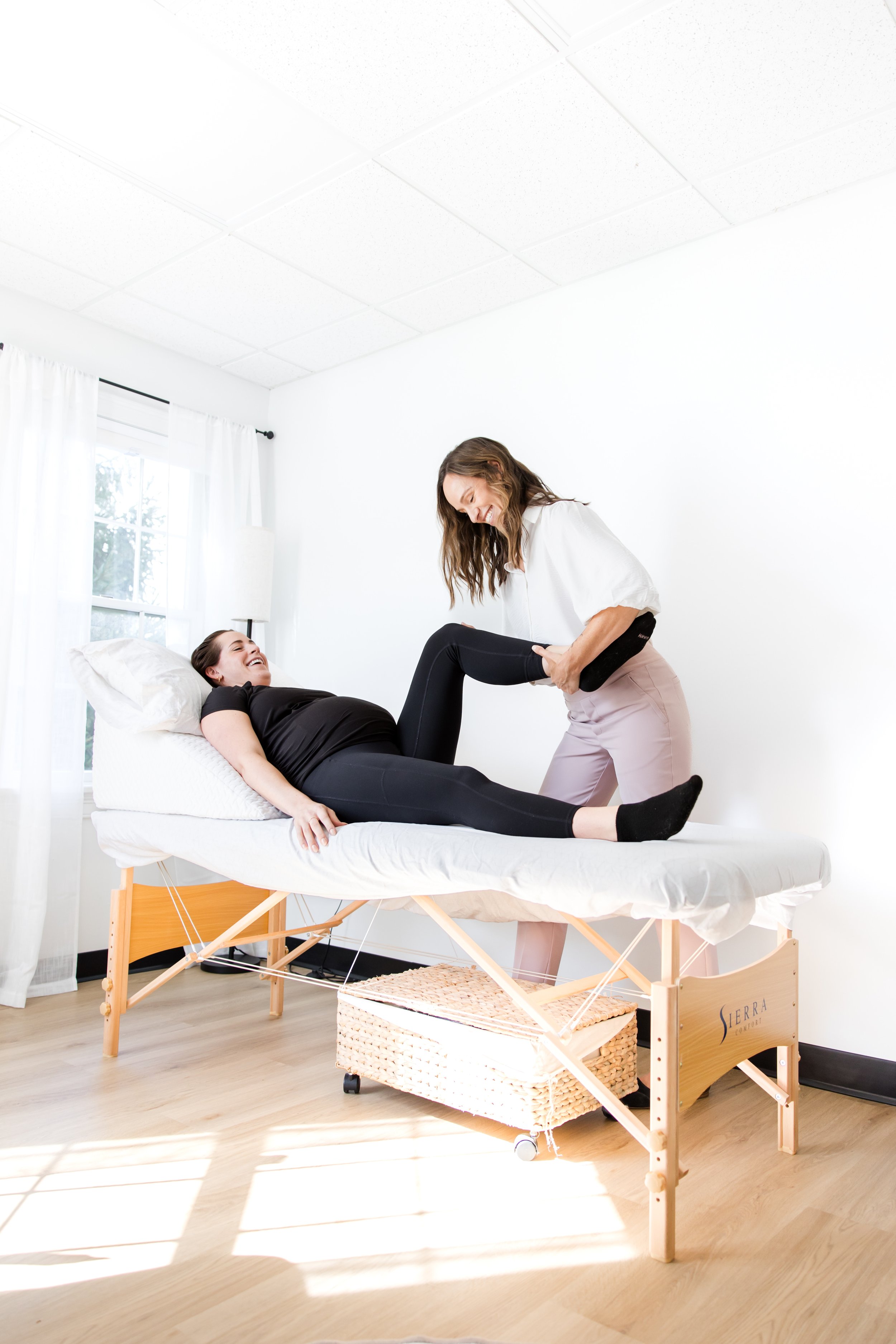
Prenatal and Postpartum Care
As you are embarking on this pregnancy journey, know that your body is about to go through significant physical and hormonal changes as the baby grows and develops. Physical therapy can help support you through all trimesters and is an essential component of a healthy pregnancy and optimal postpartum recovery.
The physical and occupational therapists at Root to Rise work closely with our patients to develop a personalized plan that targets your specific needs and goals.
We specialize in manual therapy, perinatal exercises, education and techniques that help you prepare you body for childbirth, manage discomfort and ensure optimal health during pregnancy and after delivery.
Pregnancy Care & Birth Prep
During pregnancy, the body undergoes many changes that can lead to muscle strain, joint pain, and more. Individualized pelvic therapy can address these ailments and better support you through this journey by:
Establishing a baseline and educating you on what to expect as your body changes
Providing pain management techniques and manual therapy
Offering postural education to reduce strain on muscles and joints and promote a balanced body alignment
Providing deep core, hip, and pelvic floor strengthening to maintain pelvic ring stability, better support your growing baby, and reduce stress on your surrounding joints
Teaching breathing and relaxation techniques that are essential for stress reduction and preparing the body for labor and pushing
Working on flexibility and hip mobility to better prepare surrounding pelvic musculature and joints for the baby’s delivery
Offering balance and coordination training that focuses on improving overall stability as your baby grows
Pelvic floor therapy is essential during pregnancy even if you feel great and don’t have symptoms! We help you continue to feel well, stay active, and prepare for and optimize your birth outcome and postpartum recovery.
Working with us, you will feel informed and empowered every step of the way.
Postpartum Care
Many new parents experience physical and emotional challenges during the postpartum period. Physical therapy can help address these concerns and allow you to focus more on fully enjoying the early days of parenthood. Some common challenges that are faced during the postpartum period, and how a physical therapist can help you, include:
Muscle weakness, specifically within your core/abdominal muscles and pelvic floor musculature
Postural support. As a new parent, you will spend long periods holding, feeding, lifting, and comforting your baby which can lead to abnormal postures and positions placing excess stress on your spine. We can help you strengthen these postural muscles and discuss safe lifting, ergonomic positions, and proper baby-holding techniques to reduce discomfort, prevent injury, and improve your body alignment.
Pelvic floor dysfunction including urinary incontinence
Scar tissue management. If you experienced any perineal tearing, episiotomy or underwent a cesarean section you may experience some tightness or discomfort surrounding this scar tissue. A physical therapist can teach you techniques such as scar massage to improve mobility, reduce pain, and promote healing.
Emotional well-being. Postpartum physical therapy aids in physical recovery but also promotes mental and emotional well-being by relieving pain, increasing mobility, and allowing you to reconnect with your body.
When should you start postpartum care?
We at Root to Rise recognize that the first several weeks after your little one enters the world can seem a bit overwhelming, and it can be difficult to get to appointments and receive the care you need.
For convenience, we offer a 2-week telehealth appointment where we will discuss your labor/birth story and any current symptoms you may have. Then we will educate you on how to establish self-care routines and instruct you on gentle exercises, breathing techniques, and stretches you can begin to promote healing and optimize your pelvic health following vaginal or c-section delivery.
At the 6-week mark, we offer an in-person follow-up visit where your therapist will work with you to create a customized plan that meets your needs and aligns with your recovery pace.
Embrace your healing journey. You are navigating the new demands of parenthood, and by addressing your physical challenges early on, you’re not only supporting your body’s recovery but also enhancing your quality of life. Remember, taking care of yourself is an important part of taking care of your baby. Your physical therapist can help you return to your daily activities with confidence, strength, and vitality.


